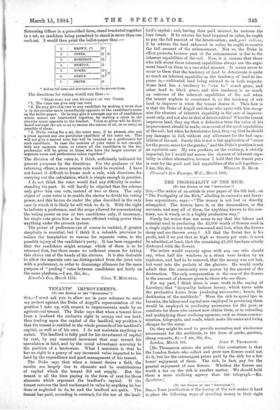THE PRODIGALITY OF THE RICH.
[TO THE EDITOR OF THE " SPECTATOR."] SIR,—The writer of an article in your paper of the 8th inst., on "The Prodigality of the Rich," alluding to excessive and luxur- ious expenditure, says :—" The money is not lost or directly misapplied. The florists have it, or the dressmakers, or the servants, and may all of them, for anything known to the con- trary, use it wisely or in a highly productive way."
Surely the writer does not mean to say that the labour and material used in producing the £2,000 worth of flowers used in a single night is not totally consumed and lost, when the flowers decay and are thrown away ? All that the florist has is his profit, and if we put that as high as twenty per cent., it must be admitted, at -least, that the remaining £1,600 has been utterly
destroyed with the flowers. • The writer would scarcely agree with any one who should say, when half the windows in a street were broken by an explosion, and had to be renewed, that the money was not lost, but went into the pockets of the glaziers. He would surely admit that the community were poorer by the amount of the destruction. The only compensation in the case of the flowers is the amount of pleasure giveit to those who see them.
For my part, I think there is some truth in the saying of Laveleye, that "inequality induces luxury, which turns aside the productive forces from producing necessaries ; hence, the destitution of the multitude." Were the rich to spend less in luxuries, the labour and capital now employed in producing them would be employed in producing necessaries for the poor, or comforts for those who cannot now obtain them, or in extending and multiplying those civilising agencies, such as steam commu- nication, telegraphs, and roads, which make life easier and living cheaper for the many. Or, they might be used to provide recreation and wholesome amusement for the multitude, in the form of parks, gardens, cheap concerts, &c.—I am, Sir, &c.,
[Mr. Thomasson misses the point. Our contention is that the London florists who collect and grow rare flowers could not do it, but for the extravagant prices paid by the rich for a few hours' enjoyment of them. The rich, in fact, pay for the general enjoyment of rare flowers. Whether the flowers are worth a tax on the rich is another matter. We should hold them a more civilising agency than the telegraph.—En. Spectator.]


































 Previous page
Previous page